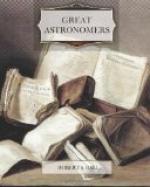We can judge of the anxiety felt by Sister Maria Celeste about her beloved father during these terrible trials. The wife of the ambassador Niccolini, Galileo’s steadfast friend, most kindly wrote to give the nun whatever quieting assurances the case would permit. There is a renewed flow of these touching epistles from the daughter to her father. Thus she sends word—
“The news of your fresh trouble has pierced my soul with grief all the more that it came quite unexpectedly.”
And again, on hearing that he had been permitted to leave Rome, she writes—
“I wish I could describe the rejoicing of all the mothers and sisters on hearing of your happy arrival at Siena. It was indeed most extraordinary. On hearing the news the Mother Abbess and many of the nuns ran to me, embracing me and weeping for joy and tenderness.”
The sentence of imprisonment was at first interpreted leniently by the Pope. Galileo was allowed to reside in qualified durance in the archbishop’s house at Siena. Evidently the greatest pain that he endured arose from the forced separation from that daughter, whom he had at last learned to love with an affection almost comparable with that she bore to him. She had often told him that she never had any pleasure equal to that with which she rendered any service to her father. To her joy, she discovers that she can relieve him from the task of reciting the seven Penitential Psalms which had been imposed as a Penance:—
“I began to do this a while ago,” she writes, “and it gives me much pleasure. First, because I am persuaded that prayer in obedience to Holy Church must be efficacious; secondly, in order to save you the trouble of remembering it. If I had been able to do more, most willingly would I have entered a straiter prison than the one I live in now, if by so doing I could have set you at liberty.”
[Plate: Crest of Galileo’s family.]
Sister Maria Celeste was gradually failing in health, but the great privilege was accorded to her of being able once again to embrace her beloved lord and master. Galileo had, in fact, been permitted to return to his old home; but on the very day when he heard of his daughter’s death came the final decree directing him to remain in his own house in perpetual solitude.
Amid the advancing infirmities of age, the isolation from friends, and the loss of his daughter, Galileo once again sought consolation in hard work. He commenced his famous dialogue on Motion. Gradually, however, his sight began to fail, and blindness was at last added to his other troubles. On January 2nd, 1638, he writes to Diodati:—
“Alas, your dear friend and servant, Galileo, has been for the last month perfectly blind, so that this heaven, this earth, this universe which I by my marvellous discoveries and clear demonstrations have enlarged a hundred thousand times beyond the belief of the wise men of bygone ages, henceforward is for me shrunk into such a small space as is filled by my own bodily sensations.”




